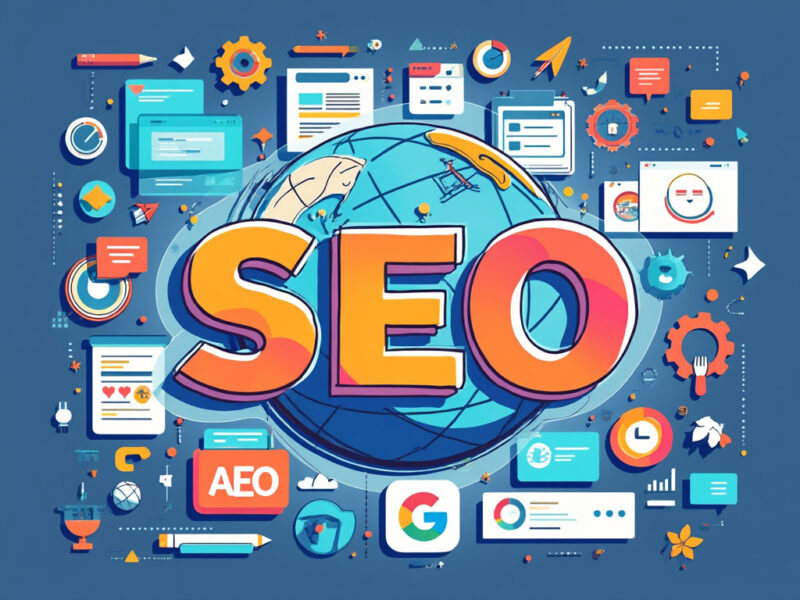
Two years ago, when I moved from Spain to the Americas, I began investigating a phenomenon that fascinated me: Understanding the Risks of the Shift from SEO to AEO. How will AI systems respond to users in a world dominated by artificial intelligence? This question intrigued me so much that I decided to write a book on the topic, which I published last week.
Not long ago, search engines like Google and Bing offered nearly identical results for the same query, regardless of who was searching. For instance, if someone in Madrid searched for “best places to visit in Madrid,” the same ranked pages would appear for all users. While ads have long been personalized, organic results didn’t reflect individual preferences.
However, with the introduction of SGE (Search Generative Experience), the game has changed. Now, search engines guide users more personally, especially if they’re signed into their accounts.
But there’s a bigger question: How do conversational AIs like Alexa, Gemini Voice, or ChatGPT handle the shift? AI systems must now deliver answers in a conversational tone. Unfortunately, most web content wasn’t designed for this. Historically, websites relied on passive, static writing styles without transition words, making it challenging for AI to reformat descriptive text into conversational responses.
And then came AEO—Answer Engine Optimization.
What Is AEO and Why Does It Matter?
AEO is all about structuring information in a way that makes it useful for AI to provide conversational answers. Imagine FAQs on a website. They’re inherently question-based and seem perfect for AI responses. However, traditional FAQs alone aren’t enough. For AI to accurately pull answers in a conversational tone, the content must be tagged and categorized explicitly.
For example, instead of just writing:
FAQs
Bla, bla, bla.
You need to tag and structure these FAQs with schemas like FAQPage markup, which tells the AI, “This is a question, and here’s the exact answer to provide conversationally.”
Many agencies specializing in traditional SEO have been aware of this shift since 2018. Yet, many still cling to the term “SEO” because rebranding might disrupt their market credibility. It’s worth noting that calling Google a ‘search engine’ today is similar to calling Amazon a ‘product finder.”
The Risks of Ignoring AEO
If Google ranks a less relevant link in the top spot, it’s not ideal but manageable. Humans can scan the results, recognize visual cues, and try another link. But conversational AIs don’t have that luxury—they must get the answer right the first time, based on a nuanced understanding of the query. To adapt, search engines are prioritizing trust signals, which, while necessary, introduce new risks.
One of the most glaring issues arises in countries like the United States, where privacy laws are lax compared to Europe. For instance, while it’s illegal in Europe to publish screenshots of private conversations, in the U.S., such actions are often overlooked. These varying cultural norms influence how AIs assess the trustworthiness of content.
Let’s take YouTube as an example. If you upload a video with a rarely used keyword, it gets indexed almost instantly, whether or not you have a massive following. Bing will display it immediately. Contrast this with text-based content: even if your blog covers a niche topic and is well-written, it won’t rank unless your domain has established authority. Without AEO or GEO (Generative Engine Optimization), you’re likely stuck in the depths of the search results—position 100 or worse.
The Reputational Danger of Negative Content
AI systems are now hyper-focused on credibility. Unfortunately, this has a side effect: Negative reviews or misinformation can significantly affect search rankings. Imagine this—your business has 50 glowing reviews and one scathing critique. If the negative review is posted on a high-authority domain like Medium, it might outrank all the positive feedback.
In the U.S., this issue is particularly problematic. My analysis shows that negative content tends to rank much higher there than in Spain, where such patterns are less critical due to stricter privacy laws. However, if a reputational crisis erupts in the U.S., its ripple effects can be global.
Publicly traded companies face heightened risks, though businesses of all sizes must navigate these challenges thoughtfully. A single piece of negative or misleading content can significantly impact stock prices and company reputation. While Google transitions cautiously, newer systems like ChatGPT Search often stumble. They sometimes hallucinate information, presenting fabricated responses as fact. Try providing ChatGPT with a non-existent link that resembles a real URL. It often invents plausible-sounding content instead of admitting it knows nothing—a dangerous precedent for trust.
AEO Recommendations for Navigating This Transition
If you’re wondering how to protect your reputation and thrive in this new era, here’s what you need to do:
- Index Your Content Strategically
- Start with Bing Webmaster Tools. Even though Bing isn’t the most popular search engine, ChatGPT Search relies heavily on it. Neglecting Bing could mean your content won’t appear in AI-generated responses.
- Leverage YouTube for Fast Indexing
- Consider uploading videos with unique keywords, as Bing indexes YouTube content quickly—sometimes within seconds.
- Monitor Google Autocomplete and Knowledge Graph
- These tools shape how users interact with your brand. Autocomplete can misinterpret queries, leading users to unrelated or even harmful content. Regularly auditing your presence ensures your brand is represented accurately.
- Use Schema Markup
- Apply structured data for FAQs, How-To guides, and articles. This tells AI exactly how to categorize and retrieve your content. Without schema, even the best-written answers can be overlooked.
- Prioritize Positive Backlinks
- Collaborate with reputable sites to strengthen your authority. AI systems weigh backlinks heavily, especially from high-trust domains.
Why the Speed of Change Demands Immediate Action
The pace of change in AI-driven systems is staggering. Ignoring AEO could leave your brand vulnerable to misinformation, negative reviews, or poor indexing. Traditional SEO remains a foundational layer, but adopting AEO and GEO strategies positions your content to succeed in the era of conversational AI.
I urge you to act now. The SEO experts aren’t raising the alarm yet, as many still rely on traditional systems. But the reality is clear: AI is already categorizing information in fundamentally different ways.
If you want to learn more about AEO and GEO strategies, I’ve identified four key categories in my book, From SEO to AEO. You can also access free tools for AEO content optimization here: AEO Mandatory Fields.
Héctor Castillo
November 19, 2024
FAQs Understanding the Risks of the Shift from SEO to AEO
YouTube aims to enhance audience engagement by delivering highly relevant content in a timely manner. Google Search, in contrast, may prioritize clicks on ads or its services, which can occasionally differ from specific user intent.
Yes. Larger companies often benefit from resources like ad spend, platform alignment, and compatibility within broader ecosystems, but smaller brands can compete effectively by adopting AEO.
Schema markup structures content in a way that AI can easily interpret, making it more likely for your answers to be highlighted in voice searches, featured snippets, or conversational AI results.
Yes! AEO directly influences how well AI systems like ChatGPT or Gemini understand and retrieve your content. By focusing on clarity, structure, and tagging, you make your expertise accessible and reliable for AI-driven responses.
By adopting AEO and GEO strategies, you position your content not just to be seen but to be trusted and referenced by the AI systems shaping the future of information. Start now—because the focus has shifted to more dynamic, interactive content.
“This article was originally published on LinkedIn and is intended as an example of how to design content for AEO purposes, avoiding duplication.This article has been translated using Google tools to ensure accessibility for audiences in various languages. It serves as an example of how content should be designed for AEO purposes. We are indexing this article translated by Google in many language”
Corrections to the article as events have changed:
As of November 22, ChatGPT is now offering more diverse results than Bing USA. This previously posed a security issue, as it displayed information that is legal in the USA but not in Europe. Additionally, injecting information into Bing — a less commonly used search engine — is straightforward, and not comparing it with other search engines or sources resulted in completely biased opinions or sources.
We welcome this change.

Comments